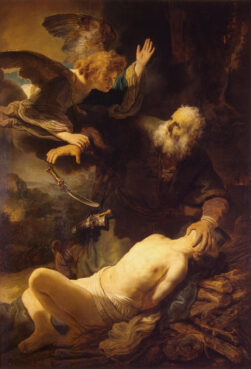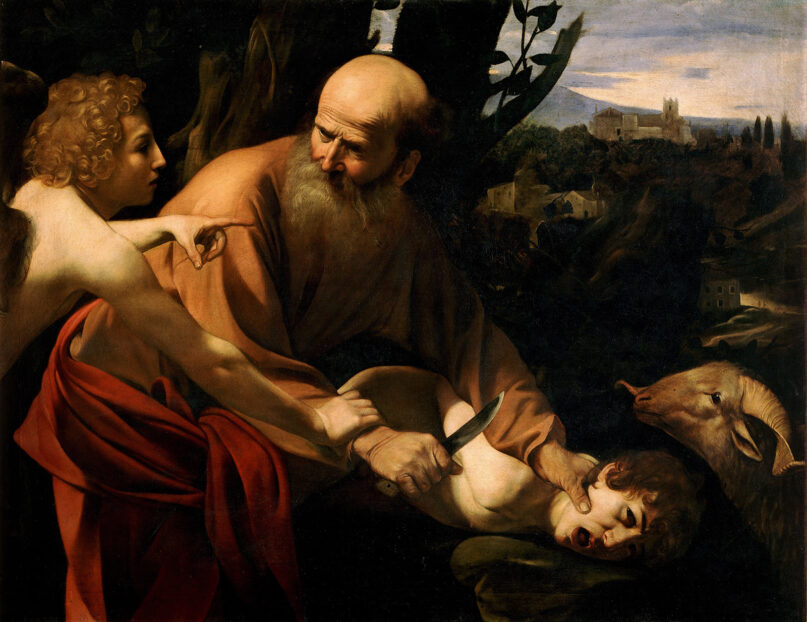(RNS) — Several years ago, a woman told me why she didn’t like Judaism.
“Whenever I come to synagogue, it’s the same story. The old guy takes his kid. He’s going to sacrifice him. He scares the (I will leave out the precise word) out of the kid. In the end, he doesn’t sacrifice him. What kind of religion is that?!?”
I asked her: “How often do you actually come to services?”
“Once a year. Rosh Hashana morning.”
I smiled. “No wonder you feel that way. On the only day that you come to services, you hear what is probably the most difficult story in the entire Torah.
“You’ve been missing the rest of Judaism.”
The Akedah, the binding (not the sacrifice!) of Isaac, is the most famous — and the most tortured — story we tell. That we tell it during theological prime time — Rosh Hashana, when all Jews are in synagogue — makes our relationship to this tale that much weightier and that much harder.
Yes, it is most likely a story of protest — against the ancient Canaanite practice of child sacrifice — which was, in and of itself, enough of a reason for Judaism to declare itself a religion of protest against the norms of the surrounding cultures.
And yes, Isaac survives.
But, I have always wondered: At what cost?
This is my own theory — which I have discussed with one of the greatest biblical teachers of our time, Avivah Gottlieb Zornberg.
My theory is that at the moment of the binding, at the moment he stared into his father’s eyes, and at the moment he felt the knife at his throat, Isaac experienced what we would now call PTSD.
On that day, Isaac gave God a new name — a name that appears only in the Book of Genesis — Pachad Yitzchak, the fear of Isaac.

“The Sacrifice of Isaac” by Rembrandt, 1635. Image courtesy of Wikipedia/Creative Commons
How does this trauma affect Isaac?
First of all, it makes him entirely passive.
So much so, that if you look at how American synagogues are named — you have B’nai Abraham; you have Beth Jacob; you have B’nai Yehuda; Beth Aaron, Beth David, Temple Isaiah …
No American synagogue currently bears the name Beth Isaac. How’s that for a diss?
More than that: Isaac is unique among the patriarchs.
He is the only patriarch who does not choose his own wife.
He is the only patriarch who never leaves the land of Israel.
Years later, Isaac is blind and passive — manipulated by his wife, Rebecca — and on his deathbed, he gives the blessing to his son Jacob rather than to Esau, who deserved it as the older son.
Then, Esau returns from the hunt, and approaches his father, Isaac — and asks for his blessing.
At that moment, Isaac is seized by — listen to these words — a charadah g’dolah, a great and terrible trembling.
Generations later, when Isaac’s descendants stand at Mount Sinai to receive the Torah, the mountain itself was seized by a great and terrible trembling, and the people experienced it as well.
Perhaps Isaac’s great and terrible trembling had moved through the generations, until at the moment of revelation, it entered the entire Jewish people.
We inherited it, and we passed it on.
The Ken Burns documentary on America and the Holocaust on PBS reminded me of something that Mark Twain famously said: “History does not repeat itself, but it often rhymes.”
- We feel that great and terrible trembling when we contemplate that our democracy is in danger. When a significant number of candidates have said they cannot guarantee they will accept the final election results, the entire vision of America is in danger, as never before.
- We feel that great and terrible trembling when we contemplate how many Americans believe in antisemitic conspiracy theories, like QAnon. Wild, crazy, unhinged ideas that American politicians actually promote — ideas that have entered the American political bloodstream.
- We feel that great and terrible trembling when we contemplate the threats to women’s right to health care, LGBTQ rights, free speech and a nuanced teaching of history in our schools.
- We feel that great and terrible trembling when we reflect on the fact that the Jews are 2% of the American population — and the victims of 60% of religious hate crimes.
- We feel that great and terrible trembling when we hear calls for Christian nationalism.
- We feel that great and terrible trembling when we hear about what is happening on our nation’s campuses — attacks that come from extreme leftist anti-Israel and anti-Zionist ideologues. Young people on our campuses report that when they talk about Israel, and when they are in the presence of other students — they have to lower their voices.
But we cannot allow that great and terrible trembling to control us. It cannot be our sole motivation.
It makes us fearful.
For, here is the truth about us American Jews.
We are not Isaac. We are no longer passive victims.
We are the envy of every immigrant group in this country. We are the most educated, the most sophisticated, the most politically astute ethnic group in this country, and we are the most empowered generation in Jewish history. No doubt this is why so many hate us.
That is what Israel means — that the Jewish people will never again be passive.
We American Jews have great power: financial, political, cultural, spiritual and intellectual.
Despite those moments that remind us of 1936, 1937 and 1938 in Germany, we Jews have a collective voice that even the greatest, cosmic chorus of shofarot cannot match.
We have not only inherited the fear of past generations.
We have also inherited the faith.
That is the lesson of the Akedah. The Danish philosopher Soren Kierkegaard called Abraham the great knight of faith. Because Abraham listened to God, disregarded his own rationality and his own sense of ethics and rushed forward to bring Isaac to the altar, that proved his faith.
I see Abraham’s faith in a different way.
Abraham went forward with the arrangements for the sacrifice, even to binding his son and raising his hand — and he did so with the full knowledge, with the full faith, that the God who had said to him he would be the father of multitudes had not lied.
That it would all end well.
That was a primal act of faith.
It is called zechut avot — the merit of our ancestors.
It is as if the fathers and mothers of our people deposited their acts of faith in a high-interest, high-yield Roth IRA (that would be a Philip Roth IRA, of course) — and we, their descendants, have been reaping the benefits ever since.
Now it is our turn to put our own deposits into that CD of faith.
I have faith in my people — in the Jewish people, in this people Israel.
I have faith that we can shake off the ashes of our despair and, with that, speak truth to the world.
We cannot build an American Judaism on fear.
We can only build American Judaism on faith — faith in God, faith in our people, faith in our history and faith in each other.
It is not a great and terrible trembling that lies before the Jewish people.
It is not fear. It is faith.
I have no fear that American Jews can do this.
For, I have faith in them, and in you.
(Excerpted from my Rosh Hashana morning sermon at Temple Israel, West Palm Beach, Florida)






